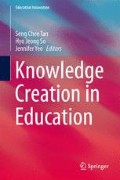Abstract
This chapter explores knowledge-building practice within a teacher community, emphasizing teachers’ continual improvement of practice while they foster continual improvement of students’ ideas. Knowledge-building practice places students’ ideas at the center of the classroom enterprise, focusing on getting students to take responsibility to improve ideas. Building on various models of teacher thinking and development, a problem space model is developed to guide the investigation and to provide a theoretically and empirically based description of shifts teachers undergo as they gain skill in knowledge-building pedagogy. The model examines the following five main problem spaces: (1) curriculum/standards, (2) social interaction, (3) student capability, (4) classroom structures and constraints, and (5) technology. This research study analyzes three sets of teacher meetings over a full school year, interspersed with excerpts of three teachers’ independent classroom practices (all three are participants of the teachers’ meeting). Results show that knowledge-building teachers construct and explore the same problem spaces as other teachers. What distinguishes them and places them on a different trajectory is the approach that brings ideas to the center in each problem space characterized by three embedded shifts: (a) surface to deep interpretation of problem and processing of information, (b) routine to adaptive approach to classroom activities and student engagement, and (c) procedure-based to principle-based reflective action.
Access this chapter
Tax calculation will be finalised at checkout
Purchases are for personal use only
Notes
- 1.
Knowledge Forum® is the second generation of Computer-Supported Intentional Learning Environment (CSILE) (Scardamalia et al. 1989). It is an asynchronous discourse medium where students and teachers author or coauthor notes that include multimedia elements, ideas, models, problems, plans, and data. Users can create graphic views as workspaces to hold these notes. Knowledge Forum also provides supportive features such as build-on, annotations, reference links to one another’s notes, and rise above to allow users to organize and summarize the collective ideas.
References
Argyris, C., & Schõn, D. (1974). Theory in practice: Increasing professional effectiveness. San Francisco: Jossey-Bass.
Arygris, C. (1995). Action science and organizational learning. Journal of Managerial Psychology, 10(6), 20–26.
Bereiter, C., & Scardamalia, M. (1993). Surpassing ourselves: An inquiry into the nature and implications of expertise. La Salle,: Open Court.
Bielaczyc, K., & Collins, A. (2006). Technology as a catalyst for fostering knowledge-creating com- munities. In A. M. O’Donnell, C. E. Hmelo-Silver, & J. van der Linden (Eds.), Collaborative learning, reasoning, and technology (pp. 37–60). Mahwah: Erlbaum
Bransford, J. D., Barron, B., Pea, R. D., Meltzoff, A., Kuhl, P., Bell, P., Stevens, R., Schwartz, D., Vye, N., Reeves, B., Roschelle, J., & Sabelli, N. H. (2006). Foundations and opportunities for an interdisciplinary science of learning. In R. K. Sawyer (Ed.), Cambridge handbook of the learning sciences (pp. 19–34). New York: Cambridge University Press.
Brown, A. L., & Campione, J. (1996). Psychological theory and the design of innovative learning environments: On procedures, principles, and systems. In L. Schauble & R. Glaser (Eds.), Innovations in learning: New environments for education (pp. 289–325). Mahwah: Erlbaum.
Creswell, J. W. (1992). Qualitative inquiry and research design: Choosing among five traditions. New York: Sage.
Dillon, J. T. (1982). Problem finding and solving. Journal of Creative Behaviour, 16(2), 97–111.
Egnatoff, W., & Scardamalia, M. (2010). Significant advances are being made in knowledge building (see, e.g., in online special issue of Canadian Journal of Learning and Teaching on Knowledge Building edited by Egnatoff and Scardamalia (2010)), Canadian Journal of Learning and Technology, Special Issue on Knowledge Building, 36(1). Retrieved from http://www.cjlt.ca/index.php/cjlt/issue/view/67
Eraut, M. (1995). Schon Shock: A case for refraining reflection-in-action? Teachers and Teaching: Theory and Practice, 1(1), 9–22.
Eraut, M. (2000). Non-formal learning and tacit knowledge in professional work. British Journal of Educational Psychology, 70, 113–136.
Lampert, M. (2001). Teaching problems and the problems of teaching. New Haven: Yale University Press.
Munby, H., & Russell, T. (1992). Frames of reflection: An introduction. In T. Russell & H. Munby (Eds.), Teachers and teaching: From classroom to reflection (pp. 1–8). New York: Falmer Press.
Newell, A., & Simon, H. A. (1972). Human problem solving. Englewood Cliffs: Prentice-Hall.
Saphier, J., Haley-Speca, M. A., & Gower, R. (2008). The skilful teacher: Building your teaching skills (6th ed.). Acton, Mass.: Research for Better Teaching.
Scardamalia, M., Bereiter, C., McLean, R. S., Swallow, J., & Woodruff, E. (1989). Computer supported intentional learning environments. Journal of Educational Computing Research, 5, 51–68.
Scardamalia, M. (2002). Collective cognitive responsibility for the advancement of knowledge. In B. Smith (Ed.), Liberal education in a knowledge society (pp. 67–98). Chicago: Open Court.
Scardamalia, M., & Bereiter, C. (2003). Knowledge building. In J. W. Guthrie (Ed.), Encyclopedia of education (2nd ed., pp. 1370–1373). New York,: Macmillan Reference.
Schõn, D. (1983). The reflective practitioner: How professionals think in action. London: Temple Smith.
Yin, R. K. (2003). Case study research: Design and methods (3rd ed.). Thousand Oaks: Sage.
Zhang, J., Scardamalia, M., Lamon, M., Messina, R., & Reeve, R. (2009). Design for collective cognitive responsibility in knowledge building communities. Journal of the Learning Sciences, 18, 7–44.
Zhang, J., Hong, H.-Y., Scardamalia, M., Teo, C., & Morley, E. (2010). Sustaining knowledge building as a principle-based innovation at an elementary school. Journal of the Learning Sciences, 20(2), 262–307.
Author information
Authors and Affiliations
Corresponding author
Editor information
Editors and Affiliations
Rights and permissions
Copyright information
© 2014 Springer Science+Business Media Singapore
About this chapter
Cite this chapter
Teo, C.L. (2014). Conceptual Shifts Within Problem Spaces for Knowledge-Building Practice Within a Teacher Community. In: Tan, S., So, H., Yeo, J. (eds) Knowledge Creation in Education. Education Innovation Series. Springer, Singapore. https://doi.org/10.1007/978-981-287-047-6_12
Download citation
DOI: https://doi.org/10.1007/978-981-287-047-6_12
Published:
Publisher Name: Springer, Singapore
Print ISBN: 978-981-287-046-9
Online ISBN: 978-981-287-047-6
eBook Packages: Humanities, Social Sciences and LawEducation (R0)

